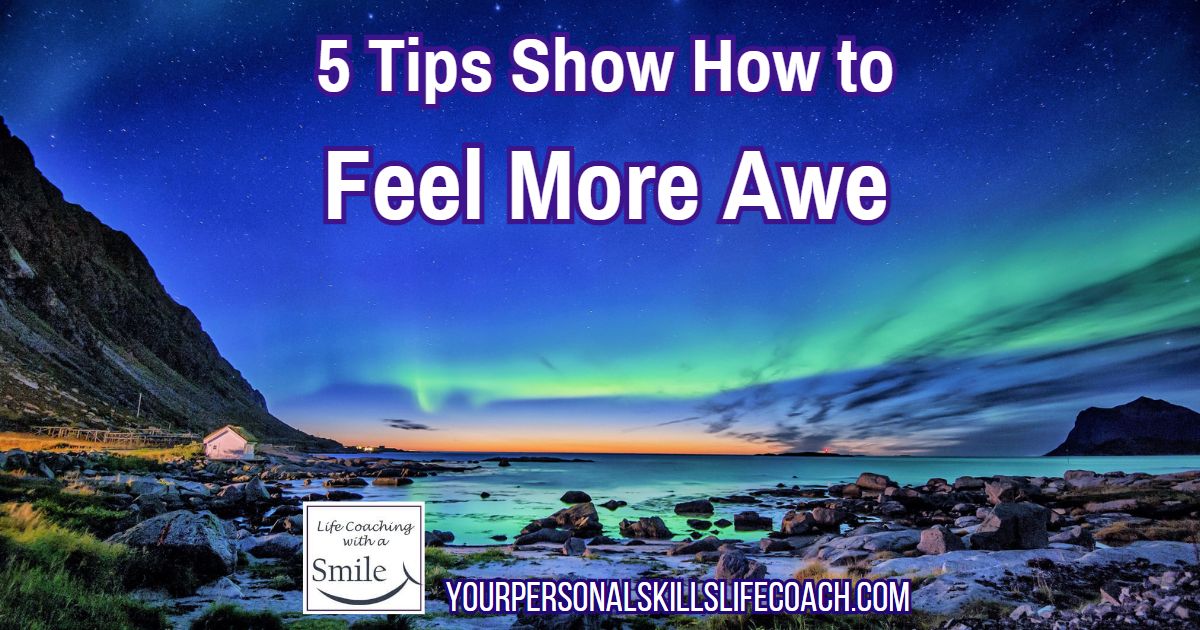Recently I have been enjoying some amazing photographs posted by my friends. One of my friends was in Scandinavia and posted a video of the northern lights. I felt like I could almost touch them. Another friend has taken me (vicariously) hiking through National Parks, Redwood Forests and past some incredible petroglyphs. No less fascinating are the photos a friend sent of the everyday life on her farm and the surrounding peaceful streams, curious owls and majestic eagles. These photos from friends made me want to feel more awe.
I felt like those awe-inspiring things were more than just fun and interesting. For me they offered peace as well as a feeling of wonder and a sense of well-being. Experiencing things that come as a surprise might send a chill up my spine. Seeing something that makes me feel like a tiny part of something vast can feel overwhelmed and minute, almost insignificant.
The Science of Awe
I began to think about events that had produced a sense of awe. Years ago, I did whatever was necessary to sit quietly lakeside and watch hundreds of birds land in a lake on their migratory path down the east coast. Watching flock after flock of hundreds of birds land and begin to fish took my breath away every time. It was 50 years ago and I remember the scene like yesterday. I didn’t know why I felt the way I felt at the time. I wanted to feel more awe. In fact, it was before the feeling of awe was even studied.
Now, I know why these events mattered. About 15-20 years ago, scientists began studying a complex and mysterious emotion called awe. Perhaps like me you might have felt it while reaching a mountain peak, or witnessing courage or kindness, perhaps you really got into a painting, a concert, a play or a significant event like seeing your child born.
Awesome Benefits of Awe
Research now suggests that experiencing awe may produce various benefits like happiness and improved health. Beyond that, studies suggest a wide range of unexpected bonus benefits in areas such as generosity, humility, and critical thinking. Seeking awe may be low on our list of priorities, but we might possibly be underestimating its power. Finding and feeling more awe could yield huge results.
It can also have an effect on our mental health. Have you ever been in the presence of something so boundless and indescribable that not only you, but also your worries and frustrations have felt insignificant? This is the power of awe.
Awe lifts us out of the ordinary. We can become more generous (with both material and non-material things.) Awe allows us to step outside ourselves, become less self-absorbed, so we can feel a sense of connection, a part of a community. It opens a pathway for more empathy to observe others and feel what they may be experiencing.
As more research progresses, the results continue to demonstrate the benefits of finding awe. A 2012 study at Stanford researched “The Awe Narrative.” This involves simply reflecting on a personal experience and then writing about it as vividly as possible. The study found that people who completed this writing exercise reported stronger feelings of awe, less sense of time pressure, and greater willingness to volunteer compared with those who wrote about a happy experience.
Another study involved older adults who took 15-minute outdoor walks in nature every day for 8 weeks. The participants reported increased positive emotions and less distress in their daily lives.
How to Feel More Awe
More evidence on the benefits of awe continues to mount. Since all it takes is being observant and mindful, it is an easy avenue to pursue. In addition, stepping outside yourself is a valuable skill. It is possible to find awe moments in many different ways and places. From looking up at the panoply of stars to examining the intricacies of a spider web you can find awe. You can find awe in nature, in art, in music, in human kindness or interaction.
Awe is sensory driven, but just hearing a great piece of music or seeing an eagle in flight isn’t apt to cause you to feel a sense of awe. You must be aware. You must be mindful. Mindfulness means maintaining a moment-by-moment awareness of our thoughts, feelings, bodily sensations, and surrounding environment, through a gentle, nurturing lens.
Researchers have identified several effective strategies for increasing awe. It requires nothing more than mindfulness, sensory involvement, curiosity and the ability to accept experiencing awe.
Spend Time With Nature
Being outdoors, looking at photos of or watching something about nature can help you experience a different world. Take a walk or try forest bathing (being in nature, connecting with it through our senses of sight, hearing, taste, smell and touch) By opening our senses, it bridges the gap between us and the world in nature. If you are unable to go out, spend time observing from your window or doorstep. Feel the breeze, hear the sounds, touch the glass and feel the heat or cold. Focus on small details or see things you have missed. Become a part of what you are viewing. Nature can help with stress and worry.
Listen to Music That Inspires You
Because music activates the part of the brain that regulates emotions and memory, it can induce awe. Studies have shown music is the language of emotion and it can trigger memories and give you chills, and seem to reach inside you. You can also feel the vibration of music through your feet or the beat through the air. Music can relieve pain and help heart health.
Focus on Your Daily Tasks
You can feel awe even during daily mundane activities. Focus on what is going on around you. Hear your baby laugh, focus on the smell and warmth of fresh coffee or baking bread. Reaching out to friends with a phone call and hearing their voice and sharing a laugh, finding the great in every day gives you opportunities for awe but it can reduce stress and diffuse the anger that can happen with monotony. Being mindful or remembering to “be where you are” can remind us that awe is everywhere.
Plant and Harvest Goodness
Help out a neighbor, foster a pet, take cookies to the teachers or nurses. Maybe write a note for your child, “ catch them being good” or leave a note for your spouse. Doing good things for others is good for us. Drop these awe bombs around as often as you can focuses our attention away from ourselves and creates awe moments for others even if they might not be cognizant of them. It adds value to our lives day to day and adds connections and awe experiences to our lives.
Bucket-List Your Awe Destinations
Where can you find awe? A museum, an art gallery, sunrise over the ocean, a meteor shower. Maybe the worlds largest ketchup museum, or ball of string. Help yourself experience awe and go to places that will allow you to connect to something outside your norm. Studies have shown that purposely exposing yourself to awe helps us transcend ourselves and feel a part of something larger. It also increases our wonder and potential to learn and explore.
More Awesome Tips
There are a few additional tips to help you on the journey to Awes. (where you might or might not find the great wizard.)
- Linger : If you are tempted to move quickly onto the next thing pause a bit take it all in and make a mental memory.
- Be Patient: Slow down and give awe a chance to appear. Literally stop and smell the roses.
- Immerse: Tune in to all your senses. What do you smell, feel, hear, etc?
- Take a step: Take a literal step back or forward and see if the new perspective gives you a broader or different view.
- Tune out: Unplug from technology let your surroundings be your channel or track just for a bit. You can do it.
In the future you can use journaling to think back and recreate your most awe-inspiring moments. Maybe vacations, or an unexpected event or discovery. What, where, when were you; Who was with you; How did it come about? Then try to describe how you felt. This can bring your awe feeling back as well as decrease your sense of time pressure, and make you more generous and harmonious with the world.
Awesome Conclusion
Awe can be found anywhere, by anyone. I once read that every day adults should look at things through the eyes of a child. Experience the joy, the awe the wonderment. It makes me smile to think about it. My cousin just got a pair of peacocks. He spends part of most days just watching them, marveling at how smart they are and how beautiful. His awe is palpable.
So find the awe in your life. It’s good for your health and well being as well as many other things. If you are lucky, maybe you will have a friend who virtually puts you in his backpack and takes you to hike around our national parks ( thanks Tom), or gets you up close and personal with the northern lights ( thanks Marcy) or shows up and takes you to new awesome adventures to find more awe.
Related Articles:
Mindfulness, Mindfulness: What is it?, Mindfulness Practices, Happiness Mindfulness, Mindfulness for Health and Happiness, A Tool to Control Stress: Mindfulness, Mindfulness FAQ’s
* Please leave a comment below. You may comment anonymously or you may use your first name. We may post or quote your comment on the website. We will never post or share your last name, email address or any other personal identifying information.

